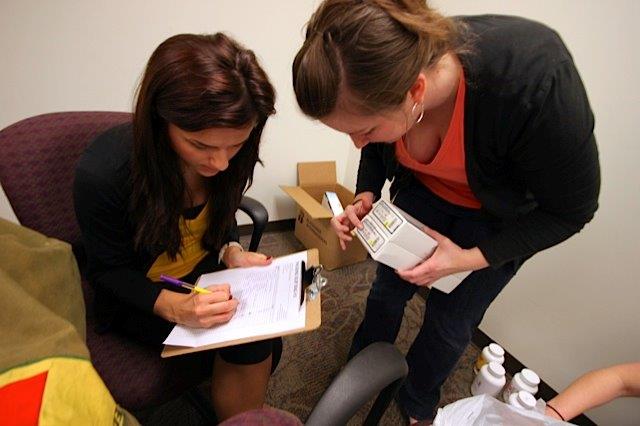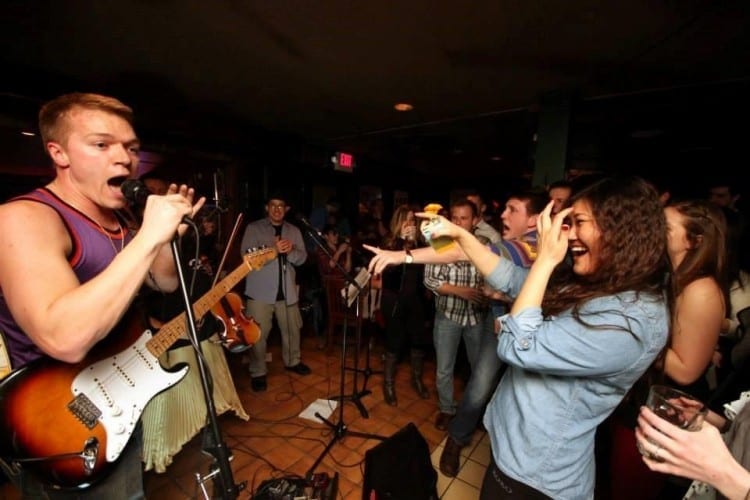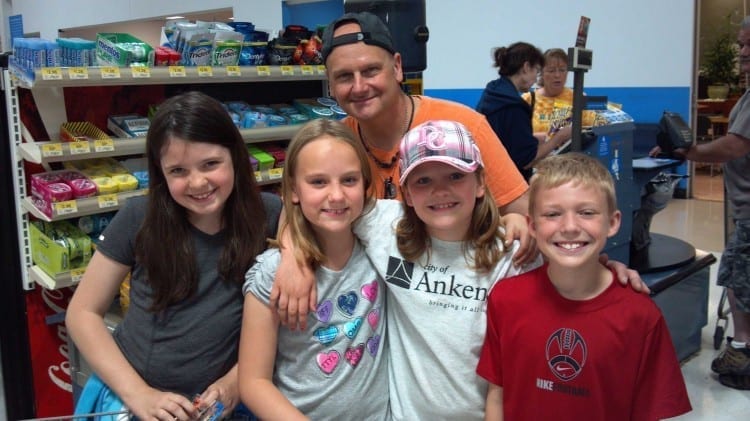The 31 students who participated in the DMU health service trip to Honduras touched the lives of
more than the nearly 1,600 patients they saw over five days in March.
They also earned the pride of the clinicians who oversaw and guided them onsite. They inspired a group of central Iowa third-graders to raise more than $300 to buy toys and books for Honduran orphans the group would visit.
Most important, the DMU students changed themselves with the experience, which renewed for them the power of compassionate, patient-focused health care.
“My biggest takeaway from the week was what Honduran dentist Paul told us: ‘As long as I have a chair, supplies and people to care for, I have a practice,’” reflected Kelsey Millonig, a dual-degree student in podiatric medicine and public health. “I plan to live by that.”
“Honduras was such a wonderful reminder of what true medicine is…
to serve those in need.”
The journey to Honduras began in August 2013, when second-year students and group leaders Daniel Cole, Brian Sullivan and Luke Wenzel began planning it, with the help of Yogesh Shah, M.D., M.P.H.’14, associate dean of global health, and Chris Catrenich, administrative assistant. Their many tasks included raising money and obtaining contributions for $8,000 worth of medications and supplies.
“Once we received all of the supplies, students worked together to package it all away in over 25 duffel bags,” Kelsey Finn, D.O.’17, wrote on the DMU blog, “Dose of DMU.”
The heroes in this effort stretched beyond the DMU students. Alayna Feilmeier, last year a third-grader at
Northeast Elementary School in Ankeny, IA , told her classmates about the experiences her mother, Mindi Feilmeier, D.P.M.’05, FACFAS, assistant professor in the College of Podiatric Medicine and Surgery, had during the University’s 2013 Honduras trip. Touched by Alayna’s descriptions of the children in an orphanage Feilmeier encountered while there, the class decided to raise money to purchase toys for this year’s group to take along. Students drew pictures their teacher auctioned off online to parents.
These little kids went big: They raised more than $300 and filled two large tubs with books, stuffed animals, dolls and more. That good deed had an extra ripple effect: In early April, Millonig and Cole visited the Ankeny school to share their experiences and photos with the third- and fourth-grade classes.
In Honduras, the DMU students and providers set up clinics in schools in two mountainous villages. They reached the first, Santa Rosa de Güinope, after a bumpy, winding three-hour ride during which their bus got stuck in a deep ditch and several students experienced motion sickness – all before seven hours of clinic time.
“When we arrived, there was already a line of local families eager to seek medical attention,” Finn recounted in the DMU blog. “The classrooms featured different aspects of our clinic – triage, health care provider assessments, women’s clinic, dental clinic and a pharmacy. The patients first met with two students to obtain their vitals and describe their medical problems. Next, they met with the appropriate health care providers….Then they dropped off their prescriptions at the pharmacy.
“As they waited for their medications, they attended ‘charla,’” Finn wrote. “‘Charla’ means ‘to chat’ in Spanish, so this is a place where we ‘chat’ with them about good health.
“Our first day was very successful, in that we saw over 200 patients,” Finn added. “Since it was our first day of clinic, it was a little chaotic. But as the day went on, we developed a good system and worked together as a team.”
The DMU students also learned a great deal from the nine clinicians who accompanied them. “They teach as they go, and they give insight to their mental process of assessing, diagnosing and treating a patient,” Finn stated.
Those lessons were difficult as well as valuable, she noted. For example, initially group members assumed that patients complaining of stomachache had acid reflux.
“Being from a well-developed country, it didn’t cross our minds that the pain could be due to hunger,” she said. “While examining a young female, a student decided to ask if she was hungry. The girl explained how she doesn’t eat breakfast or dinner and the only meal she eats is the free food she gets at school. It was heartbreaking to hear this, because there is no medication to treat hunger.”
More common problems included headache, arthritis, high blood pressure, head lice and foot fungus. Common among all patients was an expression of gratitude.
“They are appreciative and grateful for our help, despite having to walk two to three hours and wait in line for up to six hours,” Finn said in a blog post.
The perspectives they gained likely allowed the DMU students to take in stride the trip’s final test of their flexibility and patience: Their flight from Tegucigalpa, Honduras, to Texas was delayed, causing them to miss their connecting Sunday flight to Chicago. Learning the group couldn’t be placed on a plane to Chicago until that Tuesday or Wednesday, Shah of DMU’s global health office arranged for a bus to bring them home.
Students say that while that ride was no picnic, it gave them more time to reflect on their experiences, from treating patients to enjoying a fiesta to playing soccer with the Honduran orphans.
“Honduras was such a wonderful reminder of what true medicine is,” Firras Garada, D.P.M.’17, stated in a reflection after the trip. “There was no insurance to deal with, no third parties to go through or anything else to delay patient care. It was just face-to-face patient interaction and truly medicine done the way it should be, to help and serve those in need.”




